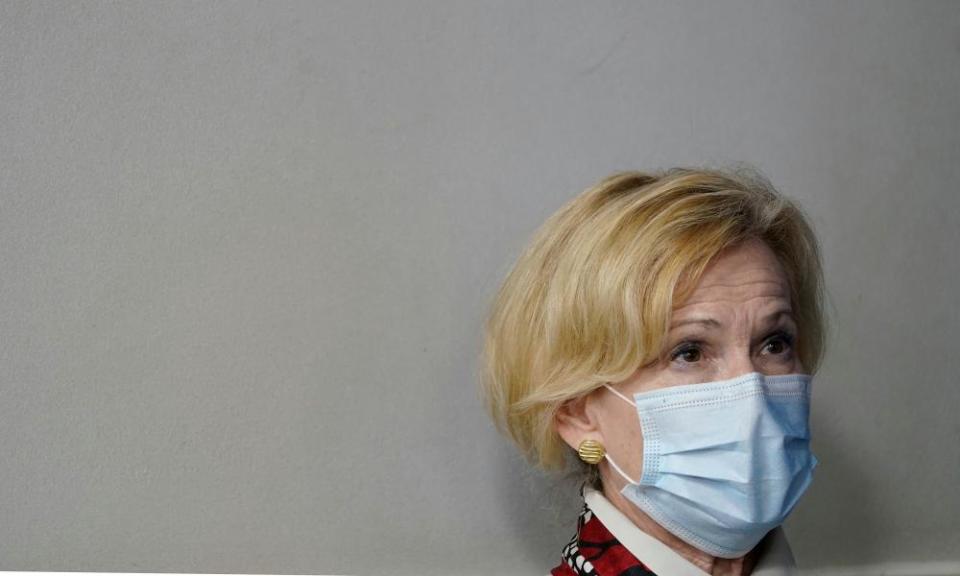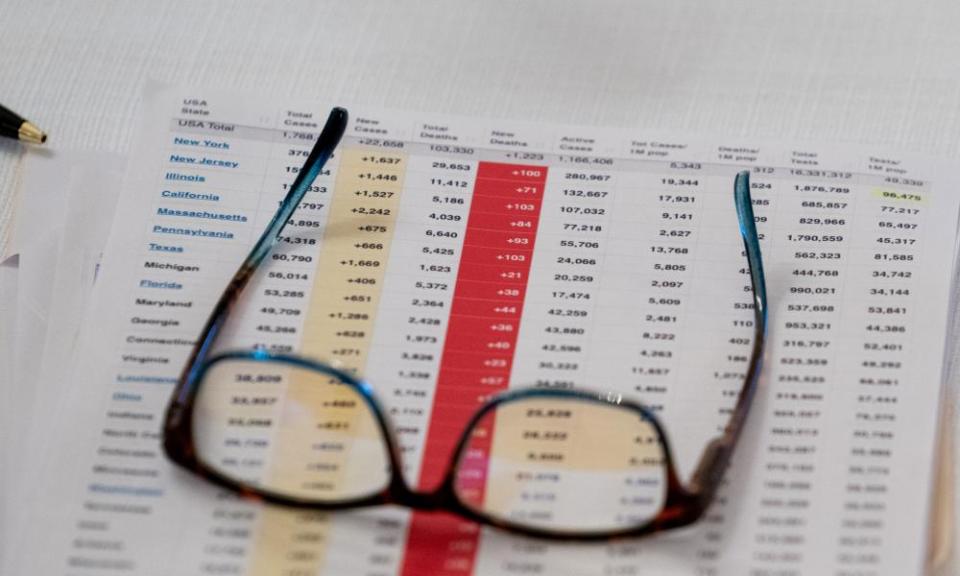Dr Deborah Birx: voice of scientific reason or apologist for Trump?

Months of frustration with Donald Trump’s denial of the coronavirus crisis in the United States boiled over last week when the Democratic House speaker, Nancy Pelosi, publicly attacked a top member of Trump’s coronavirus team, Dr Deborah Birx, for standing by the US president despite his record of lies and misinformation about the virus.
“I don’t have confidence in anyone who stands there while the president says, ‘Swallow Lysol and it’s going to cure your virus,’” Pelosi told CNN about Birx, referring to an infamous episode in April when Trump suggested that injecting disinfectant could cure coronavirus. “There has to be some responsibility.”
As the United States racks up more than 50,000 new Covid-19 cases daily – more than triple the daily number for all of Europe – Pelosi’s attack on Birx signaled an exasperation with the failure of the Trump administration to take coordinated action to combat the pandemic.
But on a personal level, the attack also represented a surprisingly direct assault on one of the most recognizable scientific faces on the team of officials Trump regularly puts before the cameras to describe the White House coronavirus strategy.
She has a very difficult job right now, because she’s dealing with someone who is not evidence-based
Birx, a scientist whose signature scarves are the subject of a dedicated Instagram account, was always known to be stepping on to a political tightrope by taking her current White House role. But now former allies and critics of Birx suggest that the renowned global Aids researcher, health official, medical doctor and army colonel has sacrificed her public mission for a more personal one – staying on Trump’s good side.
Birx’s defenders forcefully rebut that contention, saying her public guidance throughout the coronavirus pandemic has been reliable. They theorize, based on their personal experiences of working with her, that her private guidance of the president and his team has steered the administration in a useful direction, even if that is not always publicly evident.
“She has a very difficult job right now, because she’s dealing with someone who is not evidence-based, and is not understanding what needs to be done to address this pandemic,” said Kenneth Mayer, a professor of medicine and global health at Harvard who worked closely with Birx for years as a member of the scientific advisory committee of the President’s Emergency Plan for Aids Relief (Pepfar). “It’s hard.”

For six years before she joined the Trump White House, Birx was director of Pepfar, which has been credited with breaking up an “apartheid” in the distribution of drugs in Africa to treat and prevent HIV/Aids. Now, after not quite six months alongside Trump, Birx finds herself in a fight to shore up that legacy.
Her position contrasts sharply with Dr Anthony Fauci, her former supervisor and current scientific peer on the White House coronavirus taskforce, who has clashed more frequently with Trump – but has if anything risen in the public estimation for doing so.
The question for Birx is whether, after the current health emergency is past, she will be remembered as a Fauci-like figure who was able to work with Trump without becoming personally compromised – or as something else.
Birx’s critics say she deserves to find her reputation in limbo, pointing to statements in which Birx has offered sycophantic praise of Trump and allowed herself to become a prop in false Trump claims about how he is fighting Covid-19.
“He’s been so attentive to the scientific literature and the details and the data, and I think his ability to analyze and integrate, that comes out of his long history in business, has really been a real benefit during these discussions about medical issues,” Birx said of Trump in one TV outing in late March.
Alyssa Farah, White House director of strategic communications, said: “Dr Birx is an American hero and the president has great respect for her.
“She’s an army veteran who has dedicated her life to combating Aids/HIV, and is now working around the clock to save lives from Covid-19,” Farah said in an email to the Guardian.
‘She created a safe space’
Birx, 64, the daughter of an electrical engineer and a nursing instructor, grew up in central Pennsylvania, graduated college in two years, earned a medical degree and won a joint fellowship in the early 1980s at Walter Reed army medical center and the National Institutes of Health. There she became involved in early HIV research and worked under Fauci, who was about to become director of the National Institute of Allergy and Infectious Diseases, a post he still holds. “He was my mentor,” Birx said this year.
As an army doctor, Birx became a pioneering clinical researcher in the search for an HIV vaccine, overseeing a foundational study in Thailand that showed borderline efficacy from a combination of two vaccine candidates. In 2005 she became director of the global Aids program at the Centers for Disease Control and Prevention, and in 2014 Barack Obama nominated her to run Pepfar.
It was under Dr Birx’s leadership that Pepfar started allocating money for prevention to young women and adolescent girls
Established by George W Bush, Pepfar had an initial remit of improving access for millions of HIV/Aids patients mostly in Africa to antiretroviral drugs. Birx is known for expanding the program to include drugs for pre-exposure prophylaxis, known as PrEP.
“It was really under Dr Birx’s leadership that Pepfar started allocating money for prevention to young women, and to adolescent girls, as well as putting money to work with key populations” at risk of HIV/Aids including gay and bisexual men, sex workers and intravenous drug users, Mayer said.
Birx, described as “a lifelong evangelical” Christian by Religion News Service (RNS) in 2014, has nonetheless been a prominent voice in explaining how sexual abstinence education programs have fallen short in combating HIV/Aids in the countries where Pepfar works.
“There has been a delay when young women are initiating sex,” Birx told RNS. “That is terrific. But when we look at the data, a third of young women are raped as their first sexual experience. You have to talk about that and the need for change. We cannot put all of the pressure on the young woman and say ‘this is your responsibility to stay HIV-negative’ when the young woman’s experience was that she was raped at 13.”
A state department inspector general’s report issued in February found some fault with the leadership of Pepfar under Birx’s tenure, saying that “country teams consistently expressed the belief that their input was not considered” by the program heads Washington and accusing Washington of a “take-it-or-leave-it” approach.
To the extent that such rigidity of management reflected Birx’s personal touch – and other accounts have suggested that may be the case – the obstacles she faces as a member of Trump’s coronavirus taskforce represent an opposite challenge.
‘She’s been feeding his delusions’
As the coronavirus taskforce coordinator, Birx does not hold the purse strings, and she cannot control who holds the microphone. When she tells the truth in public about the crisis, as she did last weekend, describing a “new phase” of the pandemic in which Covid-19 “is extraordinarily widespread” throughout America, she earns a quick rebuke from Trump who called her statement “pathetic”.
For now, there is no public indication that Birx has lost the confidence of Fauci or other scientific peers, though activists who admired her work on HIV/Aids have offered excoriating assessments of her current role.
Peter Staley, an Aids activist whose admiration for Birx in her former role has soured, saw Birx’s hand in a stack of charts Trump brandished during a disastrous Axios interview last week to supposedly demonstrate that the United States was outstripping the world in containing the coronavirus.
The charts depicted deaths as a proportion of cases instead of as a proportion of total population, and depicted tests as a raw number instead of per capita and in context of results turnaround times and contact tracing.

“Sadly, Birx is likely behind the charts he’s waving,” Staley tweeted. “She’s been feeding his delusions.”
But Birx was not the source of the charts, according to sources close to the White House.
Birx has largely declined to speak in her own defense, but she can sound personally wounded by accusations, such as those aired last month in the New York Times, that she was cooking the data to make Trump feel that the country was in a better situation than it is.
“This was not a Pollyannish view,” Birx told CNN of her briefings to Trump. “I’ve never been called Pollyannish, or non-scientific, or non-data-driven. I will stake my 40-year career on those fundamental principles of using data to implement better programs and save lives.”
Mayer said Birx had successfully navigated delicate political shoals before.
“Her commitment to addressing the HIV/Aids epidemic was very clearcut, and I think in that role she was very meticulous in trying to get as much data as possible to inform policy,” he said.
“‘Data-driven’ sometimes is a buzzword, but I think she is a very hands-on manager and that she feels that having this information allows her to understand trends and to pick up early on whether things are going in the right or wrong direction.
“I’ve been impressed.”
